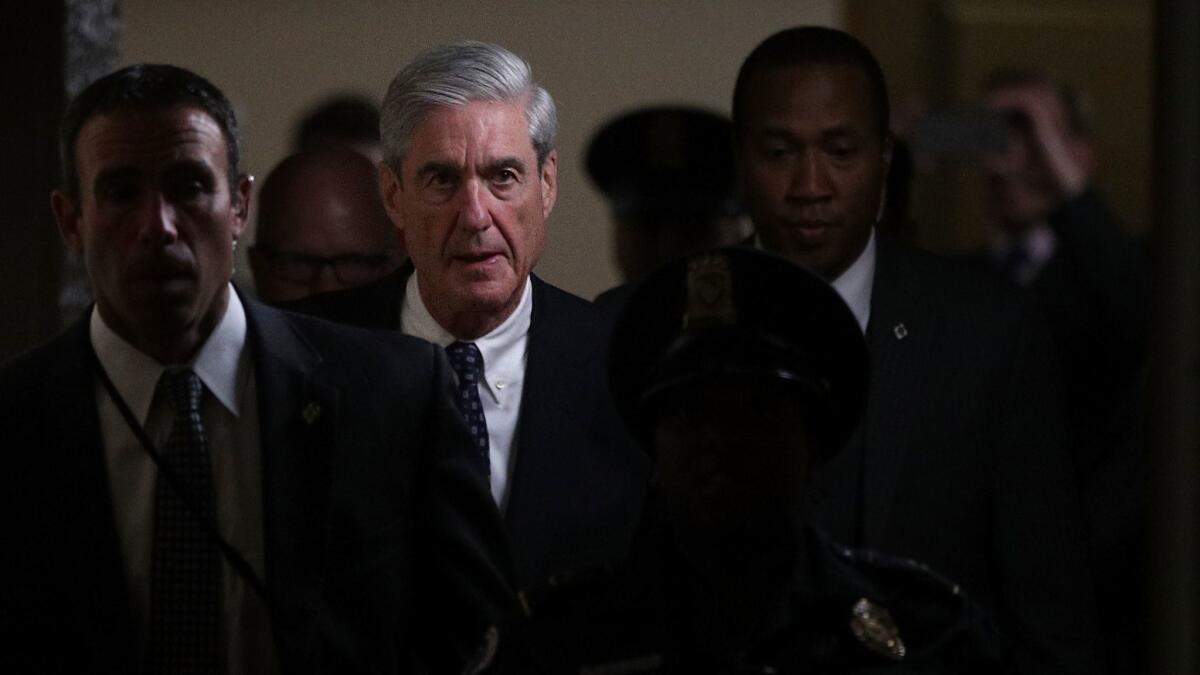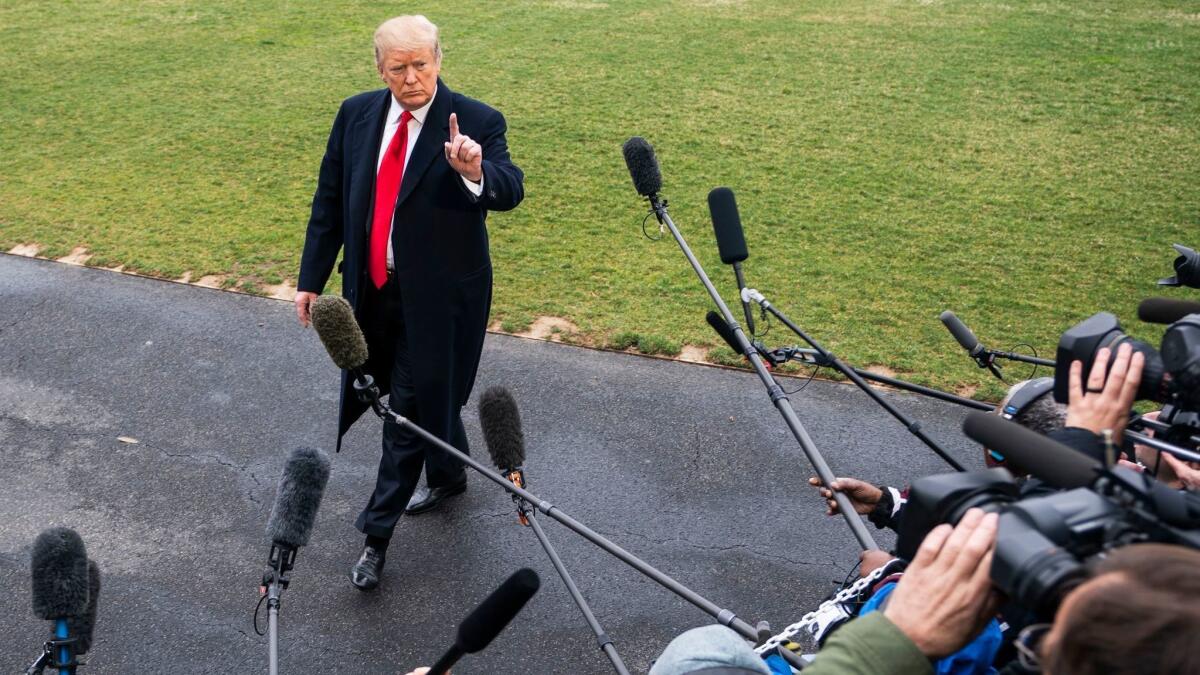Report submitted, Robert Mueller ends Russia investigation in silence

Reporting from Washington — The end of a sprawling investigation that has riveted the nation usually calls for a news conference from the person in charge, but Robert S. Mueller III chose a different approach Friday.
The special counsel sent a security officer to the Justice Department to deliver his long-awaited final report on the Russia case, then joined his wife and another couple for a quiet dinner in a favorite neighborhood restaurant.
With no photographers or TV cameras in sight, they sat in a secluded booth as cable news and social media exploded with speculation and accusations.
It was a fitting conclusion for the man whose tenure as the least talkative — yet most talked-about — public figure in Washington is drawing to a close.
Mueller, 74, is expected to step down as special counsel in the coming days, and only a skeleton crew is left in the office at this point. His report, which remains confidential for now, caps nearly two years of investigating Russian political interference, any potential conspiracy with Donald Trump’s campaign and whether the president obstructed justice.
During that time, Mueller was practically a ghost. Sometimes a snapshot would emerge of him — sitting down at an Apple store, or coincidentally waiting for a flight at the same airport gate as Donald Trump Jr.
Otherwise he was at most a blurry figure, captured behind his car window as he pulled up to the special counsel’s office in the early mornings. His name often appeared at the bottom of indictments and court filings — all told, 34 people were charged — but his subordinates did the talking during courtroom proceedings.
Mueller’s only public comment has been a single sentence, when he was appointed as special counsel nearly two years ago in May 2017, and the statement was as plain as the white shirts that he’s made his official uniform.
“I accept this responsibility and will discharge it to the best of my ability,” Mueller said.
He issued no statement on Friday when he submitted his report.
Trump often raged at Mueller’s work, repeatedly calling the Russia investigation a “witch hunt” and describing him as “a conflicted prosecutor gone rogue.” But even the president, a former reality television star, would likely give his chief antagonist one of his favorite compliments — that Mueller was from “central casting.”
Mueller’s history of public service, reticence and rectitude provided a sharp contrast to Trump’s life of tabloid shenanigans, bombast and garish wealth.
A Princeton University graduate, Mueller volunteered for the Marines and served as an infantry officer in the Vietnam War, receiving a Bronze Star for valor and a Purple Heart after being shot in the leg.
He became a federal prosecutor after the war and rose through the ranks at the Justice Department. Eventually he served for a dozen years as FBI director under presidents of both parties, George W. Bush and Barack Obama, after Obama and Congress agreed to a special law to extend Mueller’s term beyond the 10-year limit.
Mueller was working in private practice when Trump fired his successor as FBI director, James B. Comey, on May 9, 2017. In a move to preserve the independence of the Russia investigation, Deputy Atty. Gen. Rod Rosenstein appointed Mueller to serve as special counsel.

Since then, Mueller’s silence has been the counterweight to Trump’s blizzard of Twitter screeds, and the special counsel’s office earned a reputation as the rare leak-proof operation in Washington.
Mueller’s reserve was also a marked shift from two of the highest profile special prosecutors of the past generation — Lawrence E. Walsh, who spent seven years examining the Iran-Contra scandal of the Reagan administration, and Kenneth W. Starr, whose investigation of Bill Clinton and his White House lasted four years.
Starr talked publicly about his work, at one point holding a widely televised, impromptu news conference at the end of his suburban Washington driveway.
Clinton allies accused Starr’s prosecutors, who included Brett M. Kavanaugh, now a Supreme Court justice, of routinely leaking secret grand jury testimony in an effort to force the president to resign. The investigation ultimately led the House to impeach Clinton, who was then acquitted by the Senate.
Starr consistently denied any improper actions. But in 1998, as the Clinton impeachment proceedings were taking place, U.S. District Judge Norma Holloway Johnson ruled that members of his staff had engaged in “serious and repetitive” violations of grand jury secrecy rules. Johnson threatened contempt proceedings against Starr staffers in one case, but an appeals court overturned that portion of her order, ruling that she had applied too strict a standard and that the way Starr’s staff dealt with the press was “troubling” but not illegal.
A special master who investigated the leak allegations wrote a report of his findings that was never released and remains under seal.
In a recent CNN interview, Starr defended his public comments about the case and said he thought Mueller’s approach in declining to talk publicly was not wise.
“I just have a different perspective,” Starr said. “I think it’s important to provide public information that’s appropriate.”
Walsh investigated the Iran-Contra scandal, in which Reagan administration officials facilitated the sale of arms to Iran to fund the right-wing Nicaraguan rebel group known as Contras at a time when U.S support for the rebels was forbidden by law. Walsh ultimately indicted 14 people, winning 11 convictions.
Several of the convictions were overturned on appeal. And at the end of his presidency, George H.W. Bush, who was vice president at the time the scandal unfolded, pardoned the rest of those convicted, including the secretary of Defense at the time of the scandal, Caspar Weinberger.
Walsh, whose investigation was ongoing at that point, publicly criticized Bush for his action, holding a news conference in which he said that “the Iran-Contra cover-up, which has continued for more than six years, has now been completed.”
In his final news conference several months later, at which Walsh released a 566-page report and 785 pages of supporting documents, he said Bush and other Reagan administration officials had thwarted his investigation.
Reagan, in a statement at the time, said Walsh had become “vindictive” and had “used his office to harass individuals and otherwise to damage the lives of the persons he was given license to investigate.”
Both Walsh and Starr served under an independent counsel statute that expired in 1999. That statute gave them more freedom than Mueller, who is supervised by the Justice Department, headed by Trump appointees.
But Mueller’s tight-lipped approach still stands out in a city packed with people of supersized egos and camera-ready ambitions.
It’s unclear whether Mueller will be able to maintain his silence in the coming weeks and months.
Atty. Gen. William Barr is expected to provide Congress with a summary of the special counsel’s conclusions as soon as this weekend, but that’s unlikely to satisfy House Democrats who are eager for a more complete — and public — picture. Some have already talked about bringing Mueller to Capitol Hill to testify.
Mueller’s restraint undoubtedly helped inoculate him from some criticism from Trump’s allies, who were quick to criticize any whiff of political bias from investigators. They mostly targeted secondary figures instead, perhaps a recognition that they were unlikely to tarnish the special counsel himself.
House Republicans focused their ire on Peter Strzok, a former FBI agent, and Lisa Page, a former FBI lawyer, who exchanged anti-Trump text messages while working at the agency during the 2016 campaign.
Mueller removed Strzok from the special counsel’s office when the messages came to light, but critics said Strzok’s involvement tainted the probe.
Trump’s lawyer, former New York Mayor Rudolph W. Giuliani, focused on Mueller’s prosecutors, particularly top deputy Andrew Weissmann. Giuliani described Weissmann as a “complete scoundrel” in a CNN interview last summer.
Mueller himself managed to win some unlikely praise from the president’s camp, including from Abbe Lowell, a lawyer for Jared Kushner, Trump’s son-in-law and White House advisor.
During a recent panel discussion, Lowell said, “I don’t know of a special counsel who’s done it better.”
Staff writer Noah Bierman contributed to this report.
More to Read
Get the L.A. Times Politics newsletter
Deeply reported insights into legislation, politics and policy from Sacramento, Washington and beyond. In your inbox three times per week.
You may occasionally receive promotional content from the Los Angeles Times.












